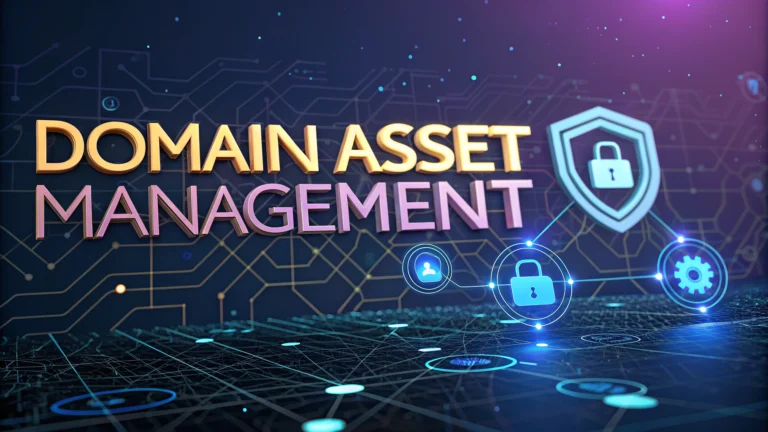Domain asset management transforms websites from simple online addresses into strategic digital investments. Professional domain investors understand that domains are more than web addresses—they’re digital real estate with significant potential value.
Understanding Domain Asset Value
Domain valuation depends on multiple critical factors. Keywords, length, memorability, and extension significantly impact a domain’s potential market worth.
Top-level domains (TLDs) like .com consistently outperform alternative extensions in perceived credibility and resale value. Premium domains often command prices ranging from hundreds to millions of dollars.
Successful domain investors analyze market trends, keyword search volumes, and potential brand applications when assessing domain potential. Data-driven strategies separate amateur collectors from professional domain asset managers.
Strategic Domain Acquisition
Targeted domain acquisition requires comprehensive research and strategic planning. Investors should focus on domains with clear commercial potential.
- Analyze keyword search volume
- Evaluate domain name brandability
- Check historical ownership and reputation
- Assess potential monetization strategies
Domain marketplaces like GoDaddy Auctions, Sedo, and Flippa provide platforms for discovering and purchasing valuable domain assets. Professional investors use these platforms to identify undervalued domains.
Domain Portfolio Management
Effective domain portfolios require ongoing maintenance and strategic optimization. Regular evaluation helps investors maximize returns and minimize holding costs.
Successful domain managers track portfolio performance using metrics like:
| Metric | Description |
|---|---|
| Purchase Price | Original acquisition cost |
| Potential Resale Value | Estimated market worth |
| Annual Renewal Costs | Maintenance expenses |
Periodic portfolio pruning ensures investors retain only domains with genuine appreciation potential. Selling underperforming domains frees capital for more promising investments.
Legal Considerations
Domain asset management involves navigating complex legal landscapes. Understanding trademark regulations and potential intellectual property conflicts is crucial.
Professional domain investors consult intellectual property lawyers to mitigate risks associated with domain ownership and potential trademark disputes. Proactive legal assessment prevents costly future complications.
Technical Optimization
Technical domain management extends beyond simple ownership. SEO-friendly configurations and proper DNS management enhance domain value.
Advanced domain managers implement technical optimizations like:
- SSL certificate installation
- Proper 301 redirects
- Clean backlink profiles
- Mobile-responsive configurations
These technical enhancements improve domain credibility and potential resale attractiveness to future buyers.
Domain Monetization Strategies
Domain monetization transforms digital assets into revenue-generating platforms. Multiple strategies exist for extracting value from domain investments beyond traditional resale.
Parking domains on advertising platforms allows investors to generate passive income while maintaining long-term asset value. Services like Google AdSense and Domain Parking platforms enable minimal effort revenue generation from dormant domains.
Development strategies can dramatically increase domain worth. Converting domains into content websites, landing pages, or niche information portals creates multiple revenue streams through advertising, affiliate marketing, and direct sales.
Advanced investors explore sophisticated monetization techniques such as lead generation, creating targeted microsites, and developing minimal viable product (MVP) platforms that demonstrate domain potential to prospective buyers.
Cryptocurrency and blockchain technologies are emerging as innovative domain monetization channels, enabling fractional domain ownership and creating new liquidity models for digital real estate investments.
Risk Management in Domain Investing
Comprehensive risk management is fundamental to successful domain asset strategies. Professional investors develop multifaceted approaches to mitigate potential financial vulnerabilities.
Diversification remains a critical risk reduction technique. Spreading investments across multiple domain categories, extensions, and market segments prevents catastrophic losses from single-asset underperformance.
Regular market research helps investors anticipate emerging trends and potential domain devaluation risks. Monitoring industry shifts, technological developments, and changing consumer behaviors provides strategic insights for proactive portfolio management.
Financial risk mitigation involves setting strict investment budgets, establishing clear acquisition criteria, and maintaining disciplined selling protocols. Successful domain investors treat their portfolios like professional investment vehicles, not speculative gambles.
Insurance and legal protections offer additional risk management layers. Specialized domain investment insurance products and comprehensive legal consultations can protect against unexpected challenges in domain ownership and transactions.
Emerging Technologies and Domain Valuation
Technological innovations continuously reshape domain asset management landscapes. Artificial intelligence, machine learning, and advanced analytics are transforming domain valuation methodologies.
AI-powered valuation tools now provide more sophisticated predictive models for domain worth, analyzing complex datasets including search trends, historical sales, and potential brand applications with unprecedented accuracy.
Blockchain technologies are introducing new transparency and verification mechanisms in domain transactions, potentially reducing fraud risks and creating more sophisticated ownership transfer protocols.
Machine learning algorithms help investors identify undervalued domains by processing massive datasets, revealing hidden market opportunities that traditional analysis might overlook.
Predictive analytics platforms are enabling more nuanced understanding of domain potential, allowing investors to make data-driven decisions with greater confidence and precision.
Conclusion: The Future of Domain Asset Management
Domain asset management represents a dynamic, evolving digital investment landscape. Successful investors must remain adaptable, technologically informed, and strategically sophisticated.
The convergence of technological innovation, changing digital ecosystems, and sophisticated investment strategies will continue reshaping domain asset management. Investors who embrace continuous learning and maintain flexible approaches will thrive in this complex environment.
Strategic domain asset management transcends simple ownership, representing a nuanced approach to digital real estate investment that requires technical expertise, market understanding, and forward-thinking vision.

